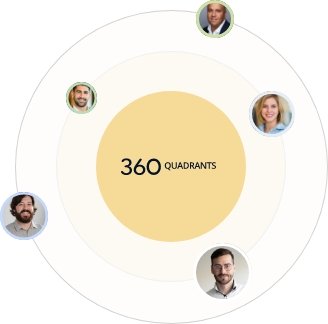User provisioning is defined as the ability to manage identities and user roles across systems, applications, and resources. User provisioning software helps enterprises create, modify, disable, and delete the user accounts across their IT infrastructure. Additionally, it enables the creation of user accounts, email authorizations, and other tasks, such as provisioning of physical resources associated with enabling the new users. User provisioning software has various business applications, such as role management, administration and management, user log management, password management, and user governance and compliance.
The MicroQuadrant matrix provides information about the major players who offer user provisioning solutions and associated services. It outlines the findings and analysis on how well each market vendor performs within the predefined MicroQuadrant criteria. The vendor evaluations are based on 2 broad categories: strength of product portfolio and business strategy excellence. Each category carries various criteria based on which the vendors have been evaluated. The evaluation criteria considered under strength of product portfolio include the breadth and depth of product offering (on the basis of the industries that the vendors cater to, and the solution and service offerings), product feature and functionality, product branding, focus on product innovation, and product quality, reliability, and support. The evaluation criteria considered under business strategy excellence include effectiveness of growth strategy (on the basis of customers and revenue generation), channel strategy and fit (on the basis of the channel partners that the vendors cater to), geographic footprint (on the basis of the geographic presence), breadth of application served and coverage, mergers and acquisitions strategy, and vision alignment.
IBM, Oracle, CA Technologies, Microsoft, Hitachi ID Systems, SAP, Dell, Happiest Minds, OneLogin, EmpowerID, SailPoint Technologies, Beta Systems, Okta, and Centrify Corporation are the leaders in the user provisioning market and are recognized as the visionary leaders. They have a strong portfolio of solutions and services in the user provisioning market. These vendors have been marking their presence in the user provisioning market by offering customized solutions as per the requirement of the commercial customers, coupled with growth strategies to achieve consistent, advanced growth in the user provisioning market.
Atos, BMC Software, Core Security, and Fischer International Identity are recognized as the dynamic differentiators in the user provisioning market. These companies have an innovative portfolio of solutions and services, and they also have an extensive network of channel partners and resellers to increase the deployment of their solutions across a multitude of business functions. The dynamic vendors have been consistently generating positive revenue growth in the user provisioning market, and their market position is boosted by the organic and inorganic ventures undertaken by them.
Avatier, CionSystems, and Omada A/S are recognized as the innovators in the user provisioning market. These companies are concerned about their product portfolios, and they have the robust potential to build strong business strategies for expanding their presence and staying at par with the visionary leaders. These vendors have been consistently offering user provisioning solutions to fulfill customer demands. They have been at the forefront for the deployment of user provisioning solutions.
Ilex International, Bitium, Someio Solutions, and Gemalto are recognized as the emerging companies in the user provisioning software market. The majority of the emerging vendors have been undertaking multiple acquisitions and boosting their sales capabilities across various regions to offer integrated solutions and services to a wide range of clients.
BUSINESS APPLICATION
The business application segmentation of the global user provisioning market includes various application areas such as role management, administration and management, user log management, password management, and user governance and compliance. With the increasing need to access devices, applications, and information, user provisioning application provides access to specific data and applications based on the user’s particular role. Moreover, when an enterprise grows, its systems, processes, applications, and interfaces also grow, therefore it is essential to control and monitor what application and information are accessed by people across the organization.
ROLE MANAGEMENT
Role management plays a vital role in user provisioning, as it provides the necessary framework for enterprises to efficiently govern access to data based on the employee’s job. It is instrumental in providing access and rights according to employee roles. Role management addresses user provisioning in four areas, namely definition, building, maintenance, and compliance. The definition phase consists of the development of the initial role framework and constructs the framework throughout the enterprise as line-of-business and function role definitions. The building area includes role mining, role discovery, entitlements discovery, and role creation phases, which enable enterprises to build. In the maintenance phase, tuning is done for the constructed roles, as well as ongoing changes throughout the systems. The compliance phase involves verification and risk management steps for roles and proliferation of regulations and audits.
ADMINISTRATION AND MANAGEMENT
Administration and management are important aspects of user provisioning. It is provided through identity administration, access management, and end-user password administration. Identity administration, along with the role of lifecycle management and other associated tools, provides administration capabilities for handling identities and access, and resource access administration. Moreover, it provides service management capabilities to administer and manage identities effectively. Access management is instrumental in focusing on authorization and entitlements managements, content access management, and network control capabilities. When a user logs in, the application performs a check to validate user identity, and once the identity is recognized and validated, the application authorizes the user to perform functions. End-user password administration also facilitates user provisioning, by maintaining user passwords, issuing initial passwords, communicating passwords to users, and resetting passwords for users.
USER LOG MANAGEMENT
User log management is the process of administering and facilitating the generation, transmission, analysis, storage, and disposal of the large volume of log data created by users. Moreover, it helps to track changes in an organization’s IT infrastructure. User log provisioning plays an important role in user provisioning for security and compliance purposes. It helps to monitor, document, and analyze system events of security intelligence. It can be deployed across on-premises, hybrid-cloud, and private cloud to index, search, and correlate data for generating insights and turning the searched data into real-time alerts to secure critical data.
PASSWORD MANAGEMENT
In user provisioning, password management is an integrated solution for managing credentials, across systems and applications. It helps in simplifying the management of password tokens, smart cards, security questions, and biometrics. Password management helps users to reset passwords, which significantly alleviate the help desk workload to address password reset requests. Furthermore, these applications ensure enhanced security by implementing strong password policies. Moreover, they help users to store and organize passwords without the need for multiple logins. The password management solution usually stores encrypted passwords, requiring the user to create a master password, which grants users access to their entire password database. User provisioning is facilitated by password management, which provides enhanced features such as password synchronization, self-service password, self-service unlock, and strong authentication.
USER GOVERNANCE AND COMPLIANCE
Enterprises today are looking forward to dealing not only with well-understood challenges, such as market competition, stringent regulations, and sustained volatility but also upholding the profitability and progress in an era defined by dynamically evolving technologies. The importance of next-generation governance and compliance management is accelerating the growth of the user provisioning market by transforming the business value and offering organizations the potential for increased profitability and competitive advantages over competitors. The changing regulatory environment across business functions such as IT, telecom, legal, HR operations, finance, and education is forcing organizations to adopt user provisioning, to mitigate the risks involved in IT operations and compliance with IT business regulations.Best User Provisioning/Governance Software
 Analysts
Analysts CionSystems provides process driven Security and Auditing to reduce support costs and quickly respond to security incidents while continuous monitoring, reporting and alerting of directories like Active Directory, ldap, openldap, office365, azure AD. CionSystems User Provisioning System creates, modifies, disables and deletes user accounts and their access across IT infrastructure and business applications based on policy.
SailPoint provides open identity platform which gives organizations the power to enter new markets, scale their workforces, embrace new technologies, innovate faster and compete on a global basis. SailPoint Predictive Identity™, uses the power of AI and machine learning to deliver next-generation identity.
The Identity Access Management Suite – Garancy, offered by Beta Systems provides set of tools for controlling and monitoring access to data and applications according to the organizational requirements and specialist role of each user. It provides a scalable connector framework that delivers ready-to-use interfaces to standard applications and systems.
BMC Remedy IT Service Management give users control of identity service requests and apply rigor to identity related business processes with integrated identity and service management. It increases customer satisfaction ratings with self-service and reduces costs by automating the identity life cycle.
Core Security provides identity and access management solutions that actionable intelligence and context needed to manage security risks across the organization. It enforce the principles of least privilege and segregation of duties (SoD) for greater internal controls.
Fischer Identity automates the complex task of managing identities for on- and off-premise resources with no limits to scalability or reach, and ensures constant access to innovation. It provides secured identity management.
Omada provides IT security solutions and services for identity management and access governance enabling organizations to achieve compliance, reduce risk exposure, and maximize efficiency. Omada Identity Suite Manage identities and govern access to resources across your on-premises and cloud-based IT-environments.
Ilex is an International software solution company that offers packaged software for managing user lifecycles and authorizations on their information system. Product is named as Meibo Identity Management. The group ensures a charge over employees throughout their time with the company and helps to Over and above it also helps in facilitating publishing and delegating management of people, structures and IT resources.
Bittium Secure Suite is the flagship product provided by bittioum which is encryption software product that complements Bittium Tough Mobile product. Bittium Tough Mobile smartphones together with Bittium Secure Suite form a unique and reliable solution for processing and transferring encrypted and classified material.
Simeio delivers the most competent identity and access management solution (IAM) that has the potential to engage with any platform at any place securely offering unparalleled services. It also compiles industry regulation and the requirement to have an outgrown pattern. By deploying this software, one can get the maximum security management options by mitigating the associated risks with end-user access.
Gemalto’s SafeNet protects and manages organizations data, identities and intellectual property through encryption, advanced key management, tokenization, and authentication and access management. SafeNet provides Multi factor authentication, Data encryption, Cloud data security, Data compliance solutions and Big data security solutions.



